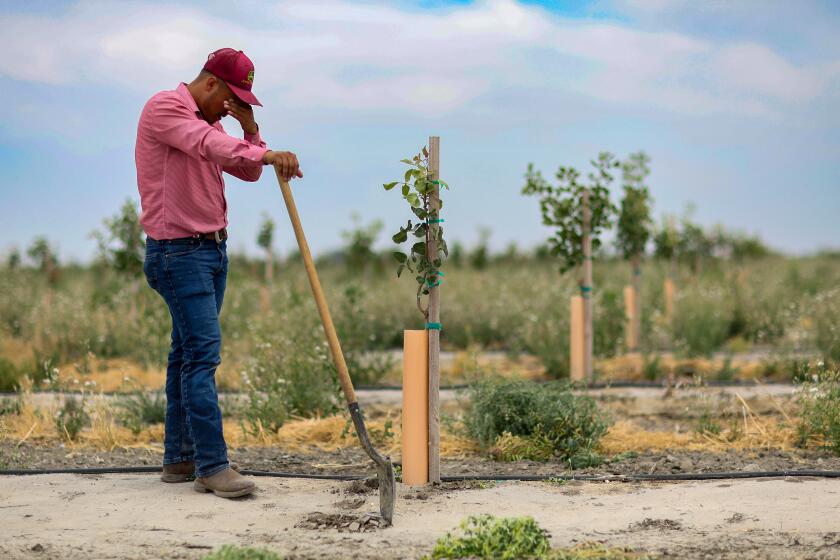City Moves Toward Voluntary Plastic Foam Ban : Environment: Pilot program, which now goes to the full council for a vote, would target beach communities.
A San Diego City Council committee unanimously approved Wednesday a voluntary pilot program to decrease the use of non-biodegradable foam cups and other food packaging in beach communities.
The program, which now goes to the full council for a vote, is similar to one implemented in Santa Cruz, where voluntary reduction in the use of polystyrene foam, commonly known by the brand name Styrofoam, has reached 47%.
San Diego environmentalists had requested a mandatory ban on plastic foam packaging, but city officials say more research is needed on the recycling and disposing of plastic foam versus paper.
Bill Harris, the city’s supervising recycling specialist, said the program will target coastal communities from Ocean Beach to La Jolla.
The city will look to community groups, environmental groups and business owners for direction on how to make the plan successful, Harris said. In particular, town councils and business improvement districts will be consulted.
The Greens of San Diego, an environmental group that last year asked the council for a ban on plastic foam packaging, called the committee’s decision a victory.
“The Greens are down on (polystyrene) because we know it’s bad for the Earth, so we requested it be banned from San Diego,” said Kip Krueger of the Ocean Beach Greens, one of the group’s six local chapters. City Manager John Lockwood “didn’t go for a total ban right now, but a partial coastal ban. There’s still work to do and pushes to be made.”
Lockwood could not be reached for comment.
Some council members say the use of polystyrene foam is not only environmentally unsound but has become a serious litter problem because it floats.
In a recent beach cleanup, 12,953 polystyrene cups and 41,520 pieces of polystyrene foam were found in one day, according to a statement from Councilwoman Linda Bernhardt, a member of the Public Services and Safety Committee, which approved the pilot program.
Mandatory bans on the use of plastic foam were implemented in Portland and Berkeley in January, 1990. In Berkeley, businesses that use it can be fined up to $500.
Bernhardt said a mandatory plan probably will not be needed in San Diego because business owners will cooperate on their own. She said the beach area was targeted because it suffers most from polystyrene litter.
“The beach area is the major area of the city that needs protection,” Bernhardt said. “We are asking that businesses, like convenience stores and the San Diego Restaurant Assn., participate. We can reduce the use of polystyrene foam through education. I am a firm believer that you always start your programs on good will and education and always give people the benefit of the doubt. I personally feel the business community in the beach area will participate.”
Paul McIntyre, president of the San Diego Restaurant Assn., said he doesn’t yet know enough about the new program to comment on it, but said local restaurants try to be supportive of any movements that “make sense for our ecology.”
Bernhardt said employees with the city’s solid waste management division will begin contacting businesses about the voluntary program in 30 days and added that she and volunteers want to persuade businesses that decreasing the use of polystyrene foam is a positive contribution to the environment.
Councilman Ron Roberts, whose district encompasses most of San Diego’s beaches, said he would like to encourage business owners to display signs in their windows saying they are banning the plastic foam.
He would also like to see a competition among businesses in Ocean Beach, Mission Beach and Pacific Beach to see which community can cut back the most on the use of the foam.
Several polystyrene manufacturers approached the committee at its Wednesday-morning meeting and said paper products are less “environmentally friendly” than polystyrene foam.
Alison Fisher of James J. Lantry Consulting, which represents several of the manufacturers, said it is ironic that the committee voted to reduce polystyrene use when recycling of the product is on the increase.
“I don’t see the reduction becoming mandatory because there won’t be positive results with the ban,” Fisher said. “The product is better than its alternatives, because it can be recycled. The polystyrene cup is much more environmentally friendly than a paper cup . . . which depletes the forests.”
Fisher said the environmental problem along San Diego’s beaches is litter, not polystyrene foam.
More to Read
Sign up for Essential California
The most important California stories and recommendations in your inbox every morning.
You may occasionally receive promotional content from the Los Angeles Times.






